A New Direction
I’ve been writing this newsletter for almost four years now and I think it’s time for some reflection about what it is and how it functions. Certainly, the newsletter has been a way for me to feel connected with those friends, family, and colleagues we are separated from because of the abrupt end of our USA life and theatre activities and our move to Paris. The newsletter has given me a chance to work on my writing skills and revisit neglected parts of my own history and psyche. This platform has provided a means for me to reflect on the reverberations that this drastic change of cultures, the setting aside of theatre after more than 50 years, and the witnessing of current world upheavals, have had on my personal development. Now as I proceed into my 70th year and I observe time’s effects on my body (the changes in the texture of my skin, the fog that sometimes invades my thoughts and memories, and the joy and peace that comes from the love around me), I want to review the Newsletter and set some new objectives for the next editions.
I know that I don’t want the Newsletter to be just another place to bemoan the state of the world (there are plenty of those on Substack right now and elsewhere) nor should it be another American in Paris guide or cultural critique (there are loads of those folks on Substack, as well). I know that I would like to investigate more deeply the work that Jairo and I accomplished with New World Performance Laboratory, in performances and in Performance Ecology workshops around the world, as well as our work with students. I started to do this in the essay I wrote about our research with Shaker songs that I published in the October 2024 Newsletter. I would like to look at what it means to do theatre on the edges, away from the popular centers of cultural activity, to serve a dedicated ensemble of artists and engage a community, to train actors (and audiences), not for Broadway or Hollywood, but for life. I would like to discover and explore more deeply the themes and practical principles that we learned in our years of work.
I also want to ask you, the readers, to let me know freely what you would like to pursue together in this Newsletter. If you have any thoughts, please share them with me.
As a way to kickstart this new direction, I thought that I would revisit some of the Director’s Notes that I composed over the years. To begin, I’ve selected several New World Performance Lab productions. In reviewing these notes, I wonder how much of what I wrote was real and how much was illusion (or delusion)? What really was accomplished in these productions beyond the blood, sweat, and tears? The ephemeral nature of theatre makes it so hard to know the effects of one’s actions—and in a culture that measures success primarily in terms of money or popularity, authentic achievements can often be overlooked—or quickly forgotten. And maybe that’s for the best. However, with humility, I ask us to re-member—and for you to help me uncover “Waldo.” What are the themes that emerge when you read these notes or recall the work in which you participated as a witness or performer? Let’s see what we can find.
Some Fragments…
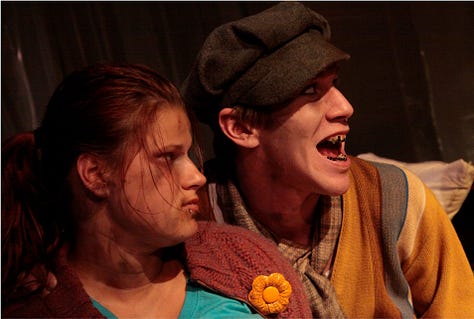
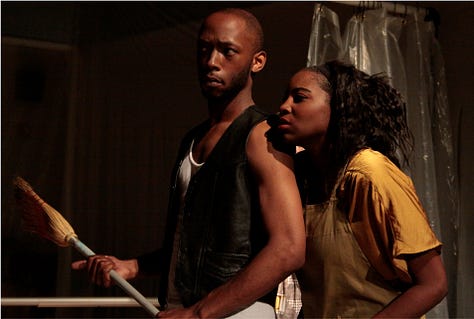
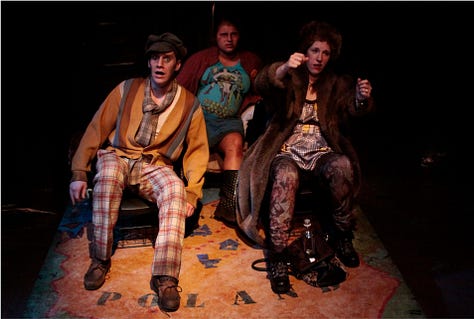
A Couple of Poor, Polish-Speaking Romanians by Dorota Maslowska (English translation by Benjamin Paloff), June 2012.
All right, I admit it. I’m nervous. This play makes me nervous. This play should make us all nervous. Because it makes us ask ourselves some hard questions about our capacity for compassion, about how much we really care about those who may have lost their way, don’t fit the norm, or have fallen through the holes in society’s infamous safety net. I’m talking about the poor. You know, those folks about whom one of our presidential candidates said he wasn’t very concerned. But, in reality, I’m also talking about us—those of us putting on this play. We are gay, lesbian, black, foreign-born immigrants, non-native speakers. We are artists and actors, clerks and caretakers, teachers and technicians, workers and students, sons and daughters, fathers and mothers. Each of us trying to make our way across the Poland of our dreams and delusions, wearing many disguises, but no one wants to give us a lift. And the lifts we do get often take us far from our destination. Each of us afraid to let go of our own garbage, because maybe that’s all there is—just garbage. But what’s important is to get to the end. Because as T. S. Eliot says: “The end is where we start from.” So, join us on this crazy, hysterical road-trip. Stay with us to the end. And maybe, together, we can find the beginning. A beginning that includes us all.
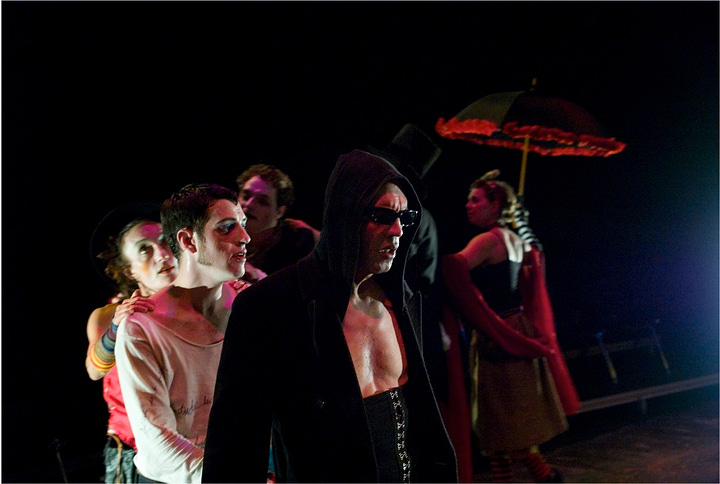
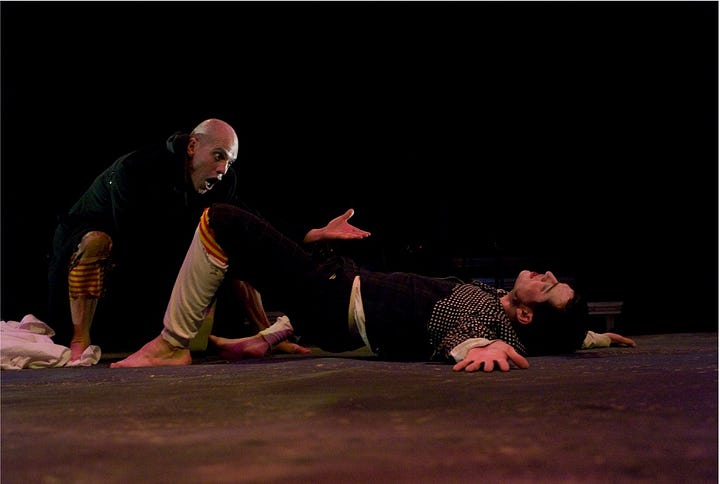
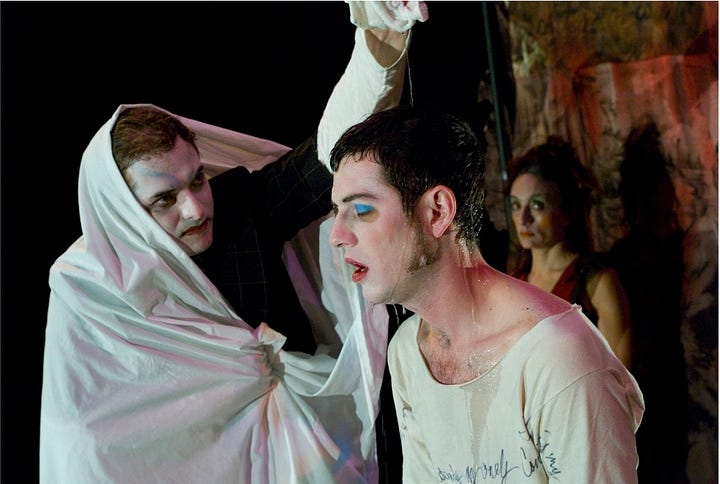
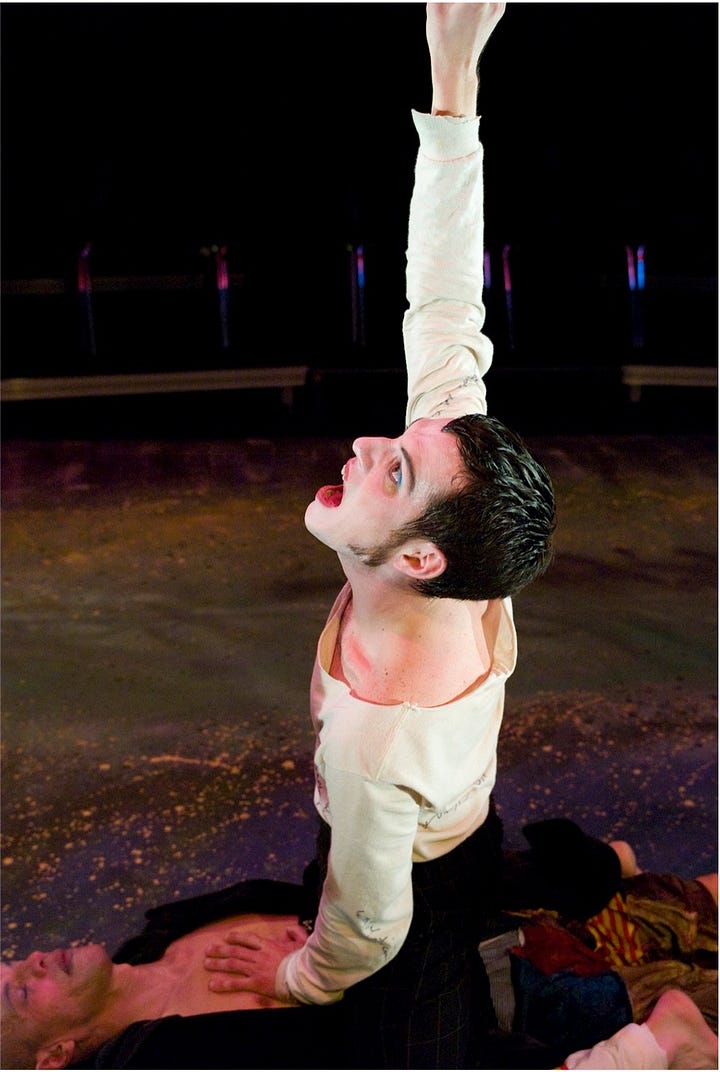
Frankenstein: A De-Monstration (2007-2009)
Mary Shelley wakes from a dream and finds herself in a desolate landscape. She is about to begin a “long and difficult voyage” towards creation. She first encounters Lucifer, in the guise of Lord Byron, who uncovers for her the rough material for her work: Woman, Man, and the Sublime. Mary then reveals her creation who eventually takes the form of Victor Frankenstein. But, almost immediately, Victor begins to revolt. He wants a Friend and as he attempts to create monuments in his own image, in his own similitude, Victor begins to resemble Mary’s husband, the poet Percy Shelley. Meanwhile, Mary suffers from nightmares about the death of her baby and the events from her life mix with the story she is trying to craft. Victor’s obsession to fashion a Friend leads him to graveyards and charnel houses as he experiments with the animation of lifeless matter. Mary and Percy’s ramblings through Europe lead them to opium dens, moonlit boat rides, and erotic encounters. After Victor gives life to his Creature, he rejects his creation. He sees himself and his desires reflected in the Creature and what was to have been his Friend, becomes for him the nameless Other—a shadow or double of himself.
As Mary’s dream continues, the landscape is charged with the mingling of the real and the fictitious: Mary’s independent thinking in conflict with her anguished and tragic love for Percy; Victor’s adolescent romantic relationship with the sublime Elizabeth, his fiancée and eventual bride; Lord Byron’s cruel passion for Mary’s half-sister, Claire Clairmont; Justine, the family friend wrongly accused of killing Victor’s youngest brother; the famous ghost story contest in the cold summer of 1816; Percy’s drowning; the Arctic wasteland; the Creature’s solitude. Nature, vampires, werewolves, witches, dead babies, monsters and more clash as Mary and each of her companions confront her/his own Other. Whether it’s the foreign Other, the sexual Other, the environmental Other, or the transcendental Other, the confrontation becomes both for Mary and for the actors in the performance, not a death struggle or an enslavement, but a de-monstration, a process of sublimation. For New World Performance Lab, it is the process of creation itself.
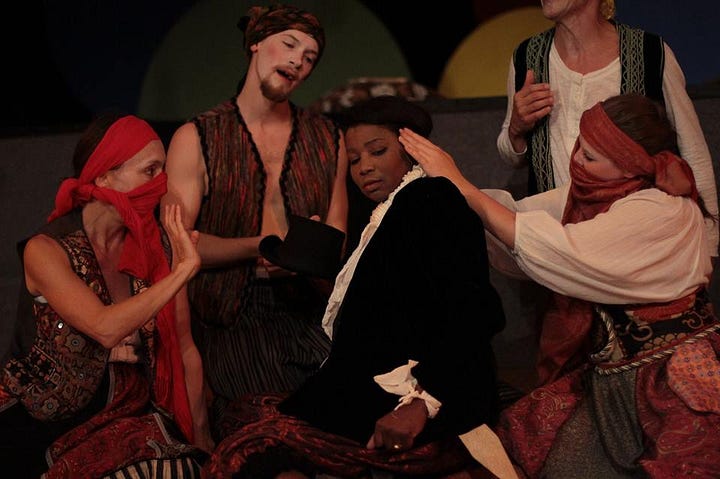
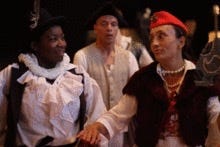
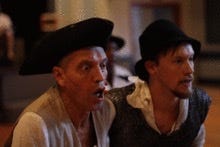
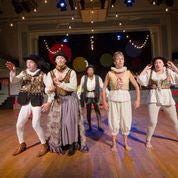
Virginia Woolf’s ORLANDO adapted by Sarah Ruhl (2014)
New World Performance Lab is very pleased to present the area premiere of Virginia Woolf’s ORLANDO as adapted by Sarah Ruhl, one of America’s most original and provocative playwrights, for the Cleveland + Akron Gay Games 9. This piece is all about transformation. And transformation is the basis of play. And play is what theatre is all about. When we began rehearsals a mere five weeks ago, I told the actors that Virginia Woolf ‘s novel Orlando was rooted in the writer’s desire for “fun.” Sarah Ruhl has captured that sense of “fun” with her witty and poetic adaptation. We have tried to find our way into the transformative escapades of these two writers with our own sense of body, space, and place. Finding the ways that these three vital instruments of the theatre can invigorate, morph, and elevate the story from the page to the stage and make the story present and alive for all of us today in Akron, Ohio. In her introduction to the adaptation, Sara Ruhl cites an article about Vietnamese Ceo theater:
In the Russian tradition of Stanislavsky, the actor says, “I will tell you a story about me.” In the German tradition of Brecht, the actor says, “I will tell you a story about them.” In the Vietnamese tradition, the actor says, “You and I will tell each other a story about all of us.”
---“In Vietnam, Telling Stories About “All of Us,” Ron Jenkins, New York Times, August 11, 2002
Enjoy the performance and, please, tell your friends about the transformations and play taking place at Balch Street Theatre!
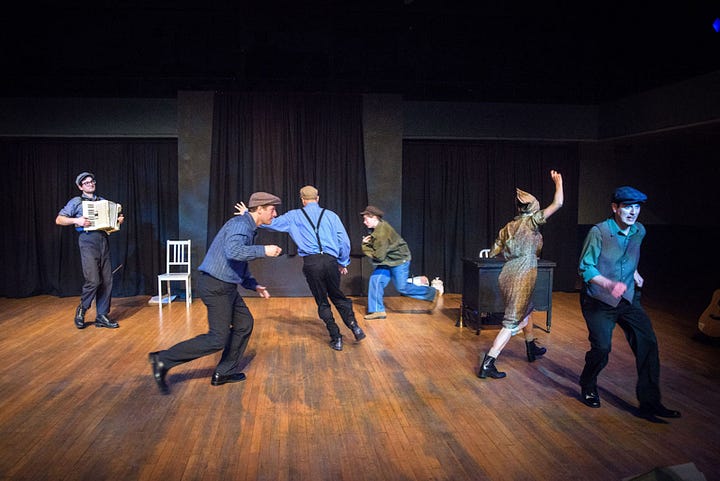
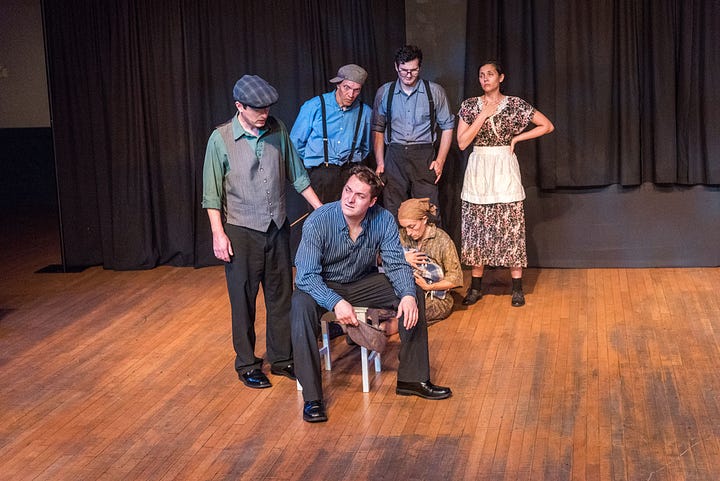
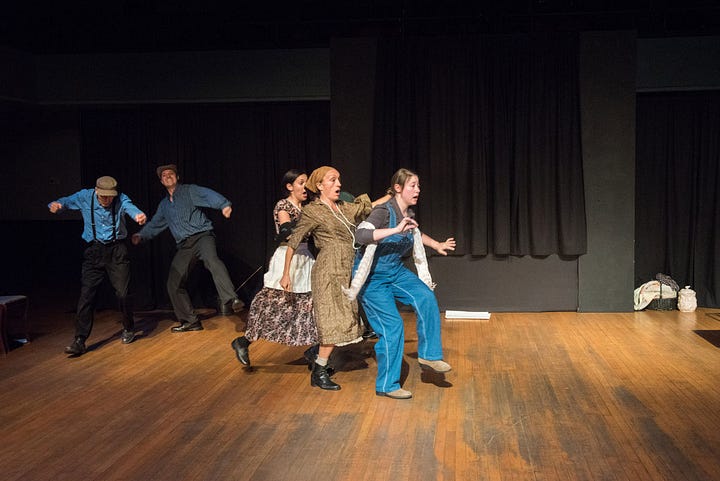
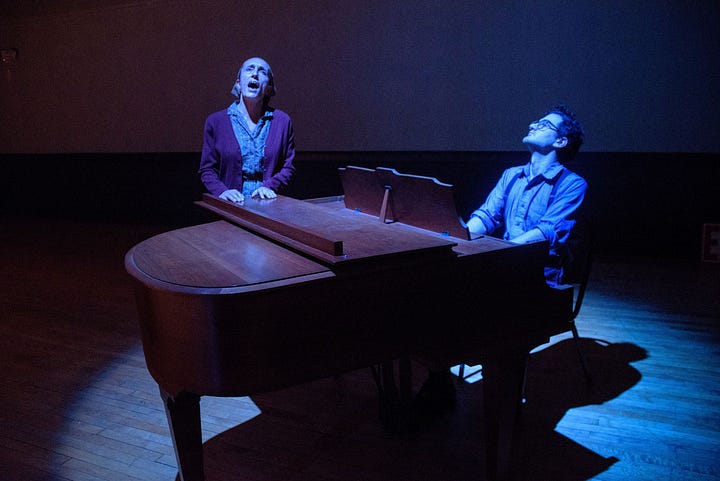
Industrial Valley, The Devil’s Milk Part 3 (2015-2017)
NWPL’s Devil’s Milk Project is a great experiment in theatre and community action. How can we tell our city’s story in a way that allows us to face the truth about the past and helps us to forge a future? Originally, this third part was to bring us to the present, but when I found Ruth McKenney’s book I knew that NWPL had to adapt it for the stage—the story the book told was too important, too relevant to what has been happening in our economy today, from the failure of the big banks in 2008 to the extreme rift between rich and poor that continues to grow and has become a major issue for the 2016 election.
When I first showed the book to the ensemble, their initial reaction was not what I would call enthusiastic. But as we started to work, the material began to infect everyone in the company. Actors came to me and said: Can I turn this story into a song? Can I write a poem about this? Can I turn this into a dance? I would assign bits to individuals or groups of actors and they would come up with a variety of ways of telling our city’s story. The colors and smells and sounds began to come alive in a vivid and theatrical way. We were reminded of the great Federal Theatre Project in the 1930s and its Living Newspaper and we found ourselves in the middle of developing our own form of living newspaper—and homage to Akron.
Dear spectators, tonight you are participating in an open rehearsal of what will eventually be the first act of the complete work—it’s very fresh, still developing. All the design and media elements are not yet there; costume, set, and prop decisions are still in process; the script itself is a first draft based on the improvisations and propositions by the actors; the players are still finding their scores and rhythms. But it is alive. And the beginning of something needed by our city.
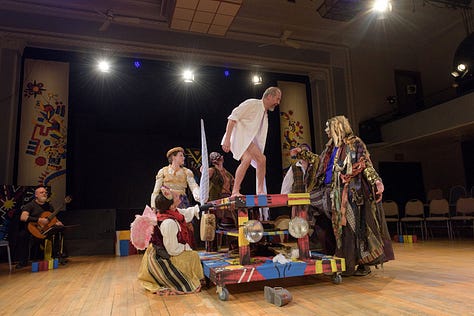
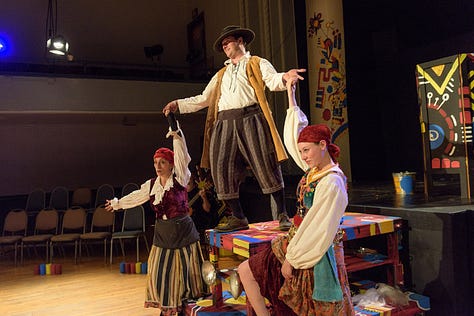
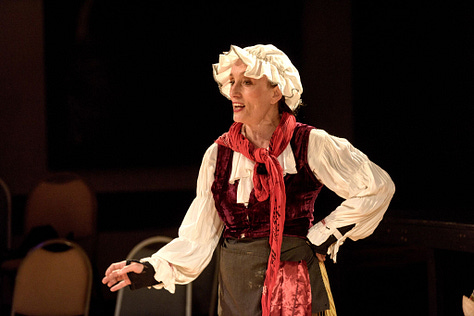
Don Quijote adapted by Patricia Suarez with NWPL(2018)
25 years of work and research in Northeast Ohio has brought New World Performance Lab to this point—a bilingual production exploring the world’s most lovable madman. In a quarter century, we have deeply investigated the traditions of Shaker songs and shape- note singing; the myths of Hamlet and Electra, Gilgamesh and Medea; freak shows, vaudeville, commedia dell’arte, Grand Guignol, and docudrama. We have staged the life stories of Antonin Artaud, Mary Shelley, and Mary Magdalene; embodied the writings of Georg Buchner, Virginia Woolf, and Jean Genet; and sung the blues. We have sat in circles telling stories; put on our traveling shoes and landed in Brazil and Bulgaria; performed Moliere in Colombia and Faust in Lebanon; formed a guild with young people in Poland; cultivated creativity on a farm in France; and sought our inspiration in the hills of Italy—with many trips to the womb of Cenci, the mystery of Matera, the beauty of Abruzzo, and the source itself, Pontedera. The last few years NWPL has spent digging roots. Deep roots here in our community. In Akron. We told the story of The Devil’s Milk and how rubber forms the muscle of humanity’s capitalist crimes. And now we are here: telling the story of Don Quijote, a story of theatre and lunacy, of clowns and caballeros, of life and death. Thank you for your support of theatre, of its ability to heal and inspire. And thank you for being here and participating in this celebration of 25 years of seeking mastery and sharing secrets.
“Art is not about something; it is something.
-Heiner Müller
And so…
Some of the themes that emerge for me as I review these five fragments are: Compassion, Creation, Craftsmanship, Community, and Play. There is certainly nothing particularly original in these five concepts as they relate to theatre. And others have already written about them far more eloquently than I ever could. I do believe, though, that I can provide a gentle reminder of the importance of these five concepts for theatre artists and some accompanying principles that can guide someone looking for a little something “more” in their theatre work. In the coming months, I will use them as a template to help organize my newsletters and musings.
What do you think?
To conclude this month, I leave you with a quotation that I included originally in my Director’s Notes for NWPL’s HamletMachine by Heiner Müller:
The relationship between man and poetry is as old as our history; it began when human beings began to be human. The first hunters and gatherers looked at themselves in astonishment one day, for an interminable instant, in the still waters of a moment of poetry. Since that moment, people have not stopped looking at themselves in this mirror. And they have seen themselves, at one and the same time, as creators of images and as images of their creations. For that reason I can say, with a modicum of certainty, that as long as there are people, there will be poetry. The relationship, however, may be broken. Born of the human imagination, it may die if imagination dies or is corrupted. If human beings forget poetry, they will forget themselves.
-Octavio Paz, The Other Voice



Thanks Jim for your posts that are always deep, comforting and original. I hope you'll go on that way.
I’m so glad you’re doing this! It is so valuable to document the almost-invisible into the deeply profound. Thank you for this new courage. New action. Comment from Ninette Larson in San Francisco area who was deeply impacted by Grotowski.